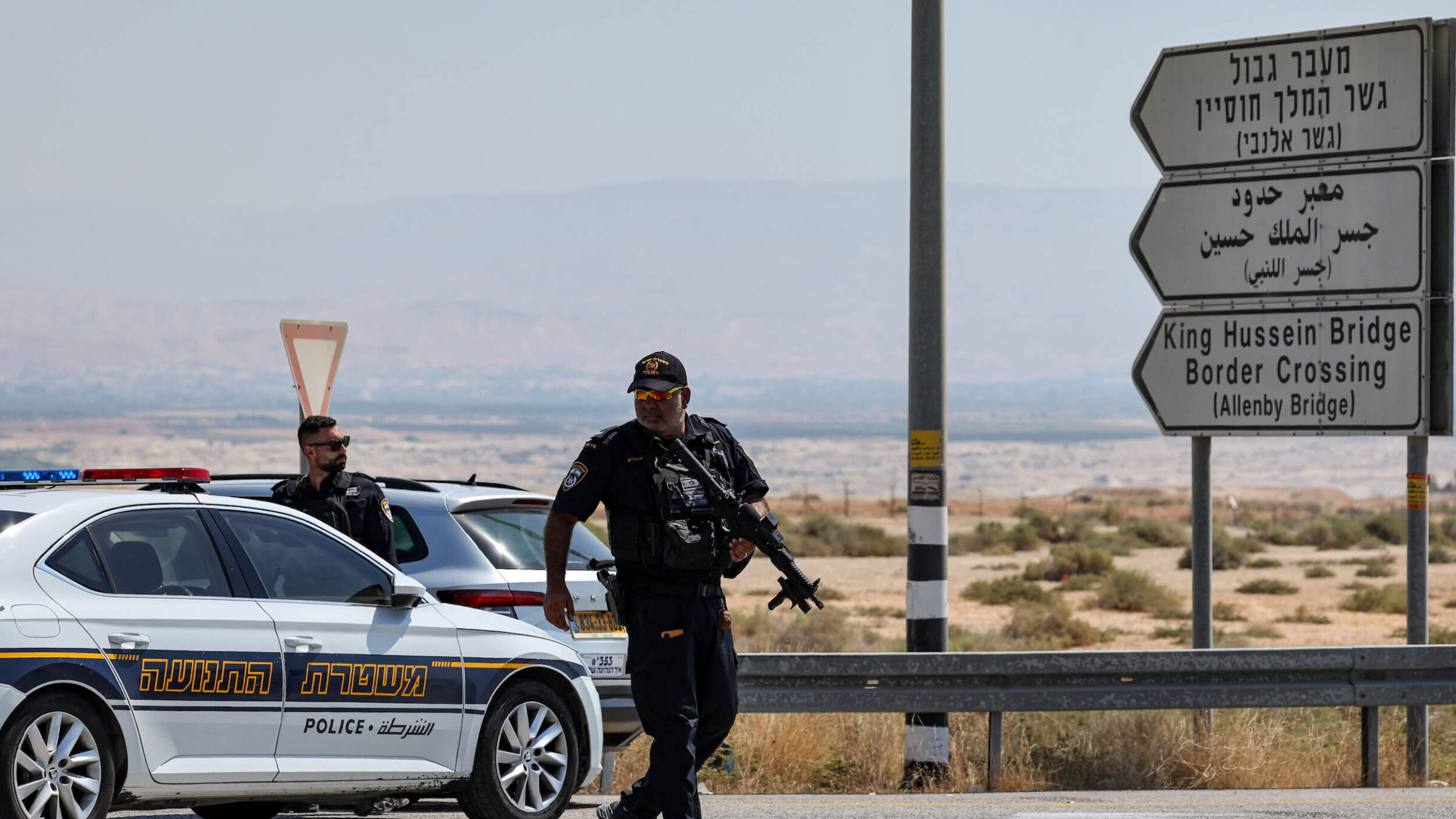After three Israelis were killed, a border crisis with Jordan is another nightmare scenario for Israel
Israel can’t afford another military conflict on one of its borders — but it might not have a choice

Israeli security forces gather at the scene of a reported attack near the Allenby Bridge between the occupied West Bank and Jordan on Sept. 8. Photo by Ahmad Gharabli / AFP / Getty Images
In the midst of fighting on multiple fronts — against Hamas in Gaza and Hezbollah in Lebanon, with threats of an eruption in the West Bank and even the Houthi militia firing at them from Yemen — Israelis now must contemplate the prospect of instability along their longest border.
That’s the upshot from Sunday’s attack at the Allenby Bridge crossing, in which three Israeli citizens were killed in a terrorist shooting, apparently by a Jordanian.
Israel’s current security situation is already perilous. The war in Gaza, triggered by Hamas’s Oct. 7 massacre, rages on, while 11 months of cross-border exchanges with Hezbollah in Lebanon have kept the region a few short provocations away from full-scale war. Destabilizing Jordan could deepen the disaster, not only militarily but also diplomatically.
That’s because of the unique and precarious geopolitical relationship Israel has with Jordan, a country that provides it with a calm eastern front and a buffer with Iraq, which is a hotbed for Iranian-backed Shiite militias. The peace treaty signed between the two countries in 1994 was a landmark agreement that ended decades of hostility and established cooperative security measures.
Yet despite being a somewhat well-run police state, Jordan’s situation is precarious. The stability of the kingdom, which is run by a Hashemite family with the backing of Bedouin tribes, always appears to be somewhat in question. The population includes a substantial number of Palestinian descendants, many of whom have deep grievances about Israel’s policies in the West Bank and Gaza, going all the way back to the establishment of the country in 1948. Their frustrations have sometimes boiled over into civil unrest. King Abdullah II has managed to navigate these pressures carefully, but the situation remains delicate.
The Allenby Bridge attack, already tragic in isolation, risks sparking a chain of events that could fundamentally destabilize that situation, with catastrophic consequences for the entire region.
Although the attacker’s motives are still under investigation, the incident raises fears that terror networks in Jordan could be emboldened amid growing unrest across the region.
One of the key concerns for Israeli security experts is that Iran, which has been instrumental in supplying weapons to Hamas and Hezbollah, could attempt to exploit any new chaos in Jordan. Iran has recently sought to smuggle arms into the West Bank, using Jordan as a transit route — which also raises concerns about some weapons remaining in Jordan, and enabling chaos there.
Moreover, reports indicate that militant groups are suspected to have strongholds in southern Jordan, where the border with Israel’s Arava region is relatively easy to cross. This southern region has long been a concern for Israeli security services, as its porous nature, amid a desert moonscape, makes it vulnerable to infiltration by militant groups.
Should the Jordanian monarchy lose its grip on power, Israel could find itself fighting along yet another front. That would further compromise its already weakened strategic depth.The military has, indeed, been preparing contingency scenarios for militant activity and cross-border attacks — and it is already overstretched.
If the aftermath of the Allenby Bridge incident leads to civil unrest in Jordan, Israel would face a difficult choice: either offer military assistance to their neighbor in an attempt to stabilize the situation, or stand by and risk watching their eastern front become a new war zone. In such a no-good-choices scenario, it may feel it has little choice but to intervene.
However, such an intervention would come with enormous risks, potentially dragging Israel into a protracted conflict with militant groups inside Jordan. What Israel cannot risk is allowing Jordan to become a replica of Lebanon, where a sovereign state stands by as militants use its territory to attack the Jewish state.
Nonetheless, there is reason to maintain optimism. The Israel-Jordan peace treaty has survived numerous terrorist attacks in the past, including a 1997 incident in which a Jordanian soldier opened fire on a group of Israeli schoolgirls on a field trip at the “Island of Peace” in Naharayim, killing seven. King Hussein of Jordan visited the families of the victims in Israel to offer condolences, demonstrating commitment to the peace treaty.
Indeed, Israeli-Jordanian relations have long been shaped by cooperation in the shadow of conflict. During the 1948 Arab-Israeli War, Jordan’s Arab Legion captured the West Bank and East Jerusalem, leading to decades of territorial dispute. But behind the scenes, Jordan and Israel maintained a relatively pragmatic relationship. Hussein engaged in secret communications with Israeli leaders throughout the 1960s and 70s, even as Jordan participated in the 1967 Six-Day War.
In the current context, Israel must prepare for the worst while hoping that the Jordanian government can maintain control. Moreover, keeping a lid on the situation in Jordan becomes yet another reason to prioritize finding a way to wind down the Gaza war. The stakes could not be higher.






















